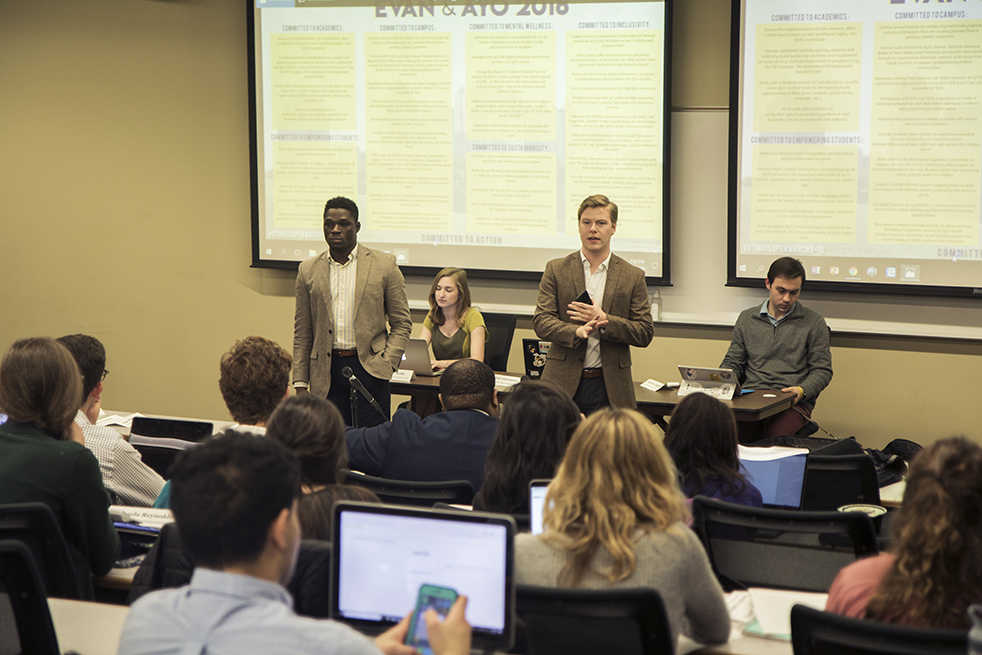This year’s Student Government Association (SGA) election cycle is bound to the fact that the undergraduate executive campaign of Evan Gillon and Ayo Aladesanmi is going unopposed by a single other ticket.
“ … For president and VP — because it is such a visible position — I was really shocked that there was only one person trying to run,” said Reagan Johnson, SGA elections chair. “And the only thing that I can really think of is maybe there’s some sort of changing culture happening
on campus.
“Maybe a lot of people don’t see SGA as the avenue for creating change on campus,” she continued. “I don’t completely disagree with that standpoint. I think there’s lots of other great avenues to really change what people feel like is missing from Georgia Tech campus and I think maybe with this particular group of students that that might be the case, that maybe they just don’t see SGA as the right place to start making change.”
There was one other prospective ticket, to be ostensibly composed of presidential candidate Zara Farooq and vice presidential candidate Hannah Shotwell. It encountered obstacles: Their application was submitted after the deadline for executive tickets, resulting in the proposal of a bill to extend the deadline. The bill was passed after a several-day discussion period involving multiple branches of SGA.
According to Johnson, the decision on whether to allow the extension took an extended period of time to resolve due to the nature of it being untrodden ground that SGA had not come across before in recent memory. She said that Dean of Students and Vice President of Student Life John Stein stated that it was not something that had happened during his time
at Tech.
“It was something that was really new that we didn’t know how to handle,” Johnson said. “There’s not anything about it in the elections code. There’s nothing about it in the SGA rules and even UJC really hasn’t dealt with a situation like this before. So, in the future we’re hoping that we’ll be able to put some provisions in place to at least give some guidelines about what steps to take on this problem. This problem may occur in the future. But we really kind of had to make it up as we went along this time.”
If the bill had not been passed, Gillon and Aladesanmi would have been the de facto winners due to the lack of contest. And now, irrespective of the bill, they are. Soon after the
extension bill was passed, Zara dropped her campaign, citing “personal issues.”
In any case, while it was nominally intended to allow for an election application extension due to concerns that the window had been shortened, the bill did become a sort of proxy for debate around whether an unopposed executive ticket should be allowed to stand, according to Johnson.
“ … I don’t think it was necessarily a referendum against Evan, but a referendum against, ‘Are we really going to let one team run unopposed and unchecked?’” she said in regards to the discussion on the bill. “And my original intention — and Richard who wrote the original bill to extend the deadline for UHR applications — our intention for extending it wasn’t because we thought that it was going to be unopposed or something like that, but because we changed up the elections this year.
“It was a three-week window for applications instead of four,” Johnson explained. “And after seeing that a lot of people still didn’t know that applications were open, we felt that was a little unfair. And that’s why we extended UHR.
“So when Daniel approached us about extending it for president and VP as well … we hadn’t thought of that, but that makes a lot of sense, we support this decision,” Johnson continued. “But once it started being discussed in UHR it turned from, ‘Oh we’re changing this because it lengthens the elections application window that had been shortened for whatever reason this year’ to ‘Should we be letting a team run unopposed, yes or no?’”
In discussing further how a potentially changing culture might be affecting students’ enthusiasm for participating in SGA, Johnson articulated that perhaps steps need to be taken in order to introduce students more gradually to the organization. She described how one possible avenue to getting a greater degree of involvement was an increased focus on SGA’s committees.
“After elections are over, the new president and VP pick their cabinet, and then the cabinet people help pick the committee chairs under them … those committee chairs are recruiting and trying to get people to join their committees — I think that’s something that really needs a really big push next year,” Johnson said. “Just making sure that people are getting involved in SGA in a pretty noncommittal way, because serving on a committee you’re maybe going to a meeting two or three times a month. And I think that’s a really good way to start seeing what SGA is about.
“Learning some of the rules, maybe even sitting in on some of the UHR meetings if something concerning your committee comes up in UHR. And I think that will really get people who were a little bit more hesitant about participating in SGA used to what the organization is about.”
